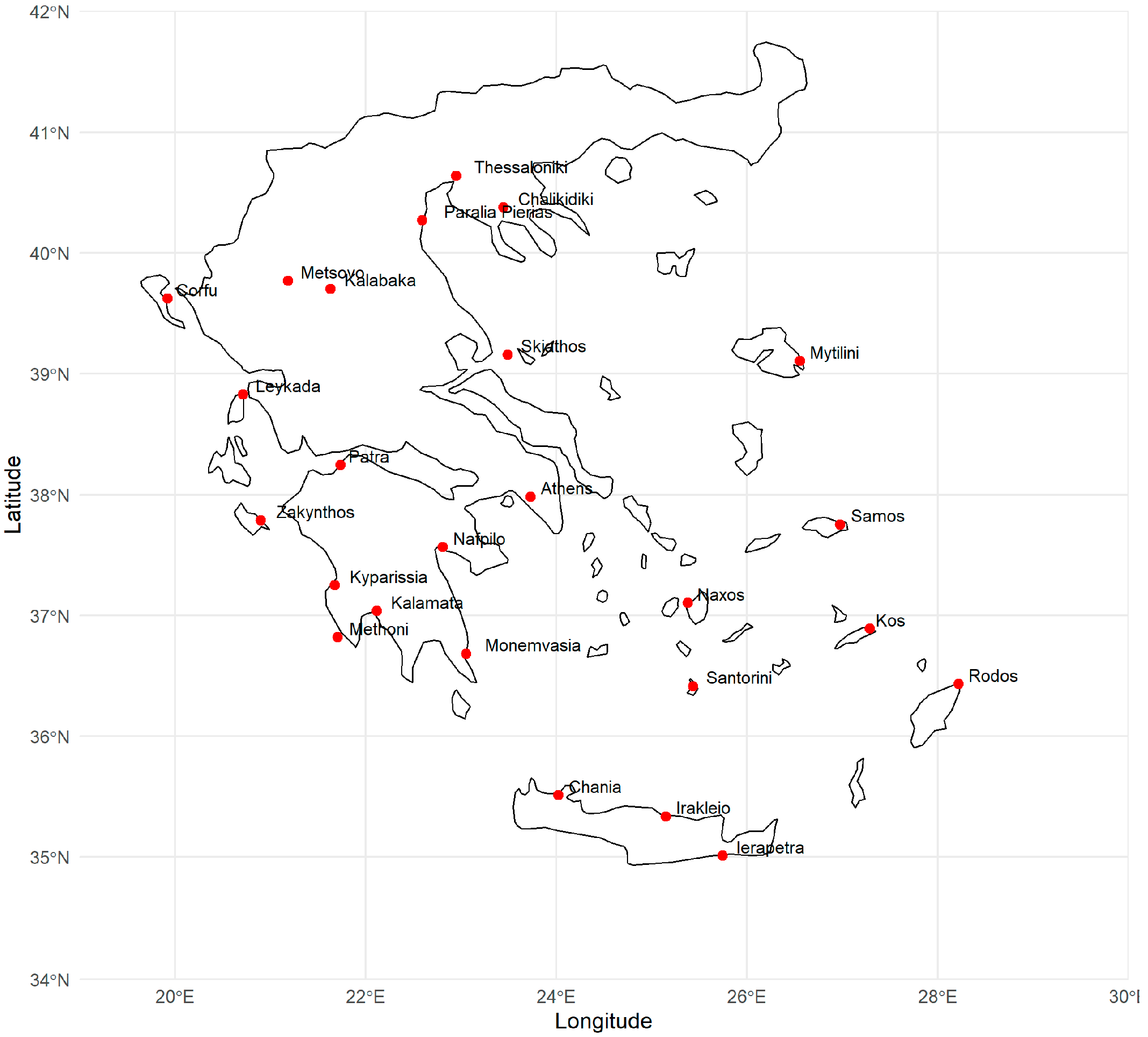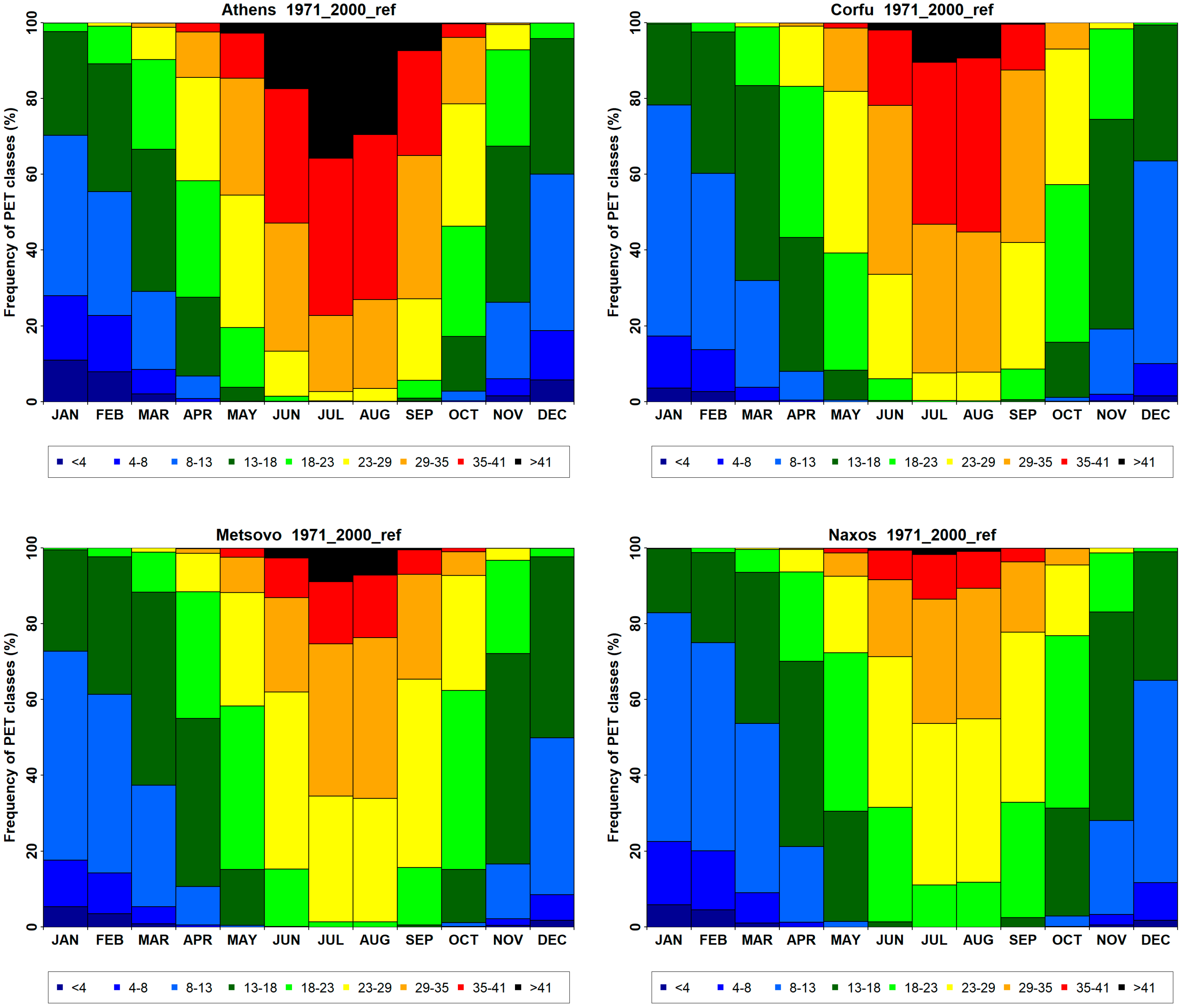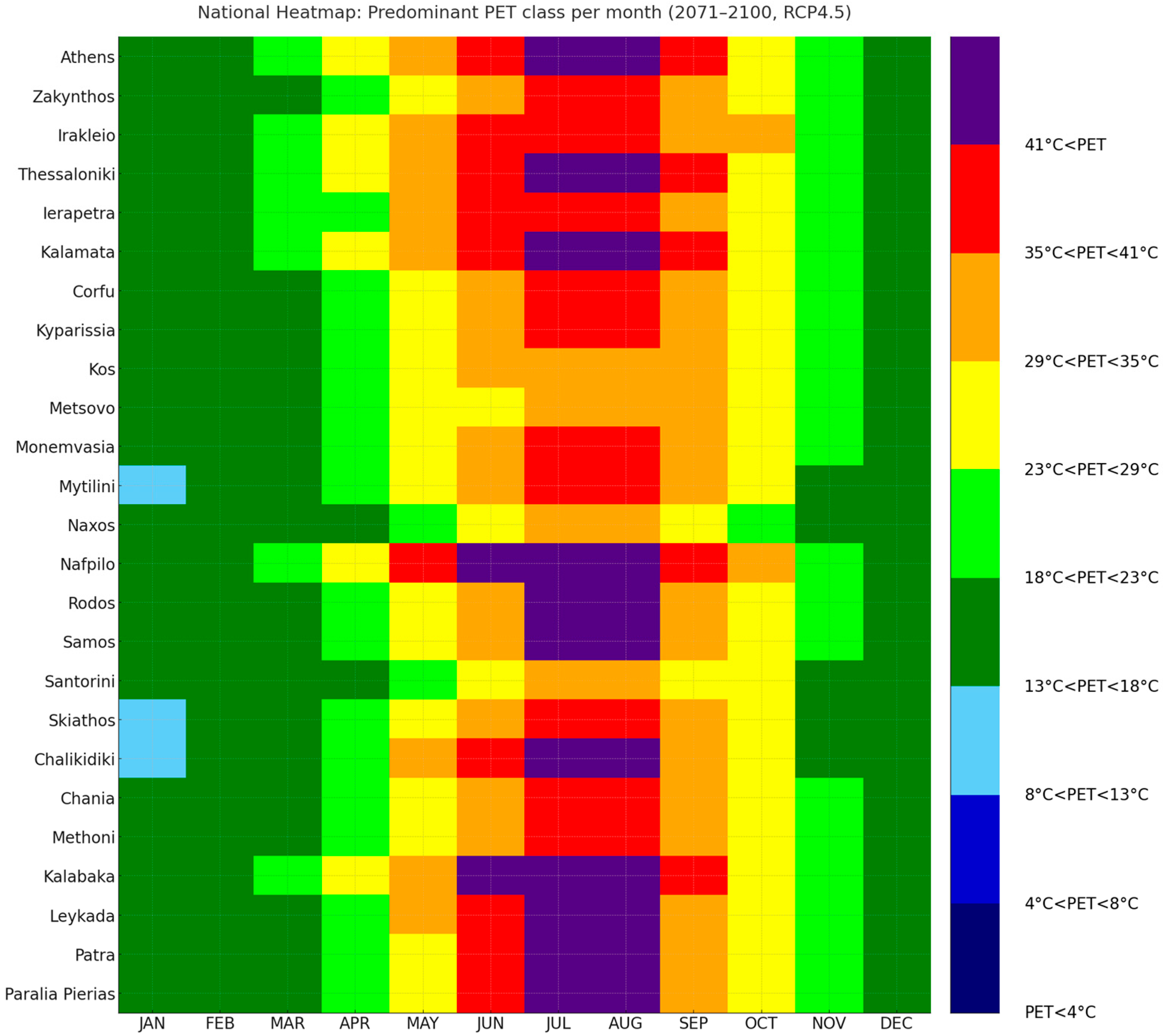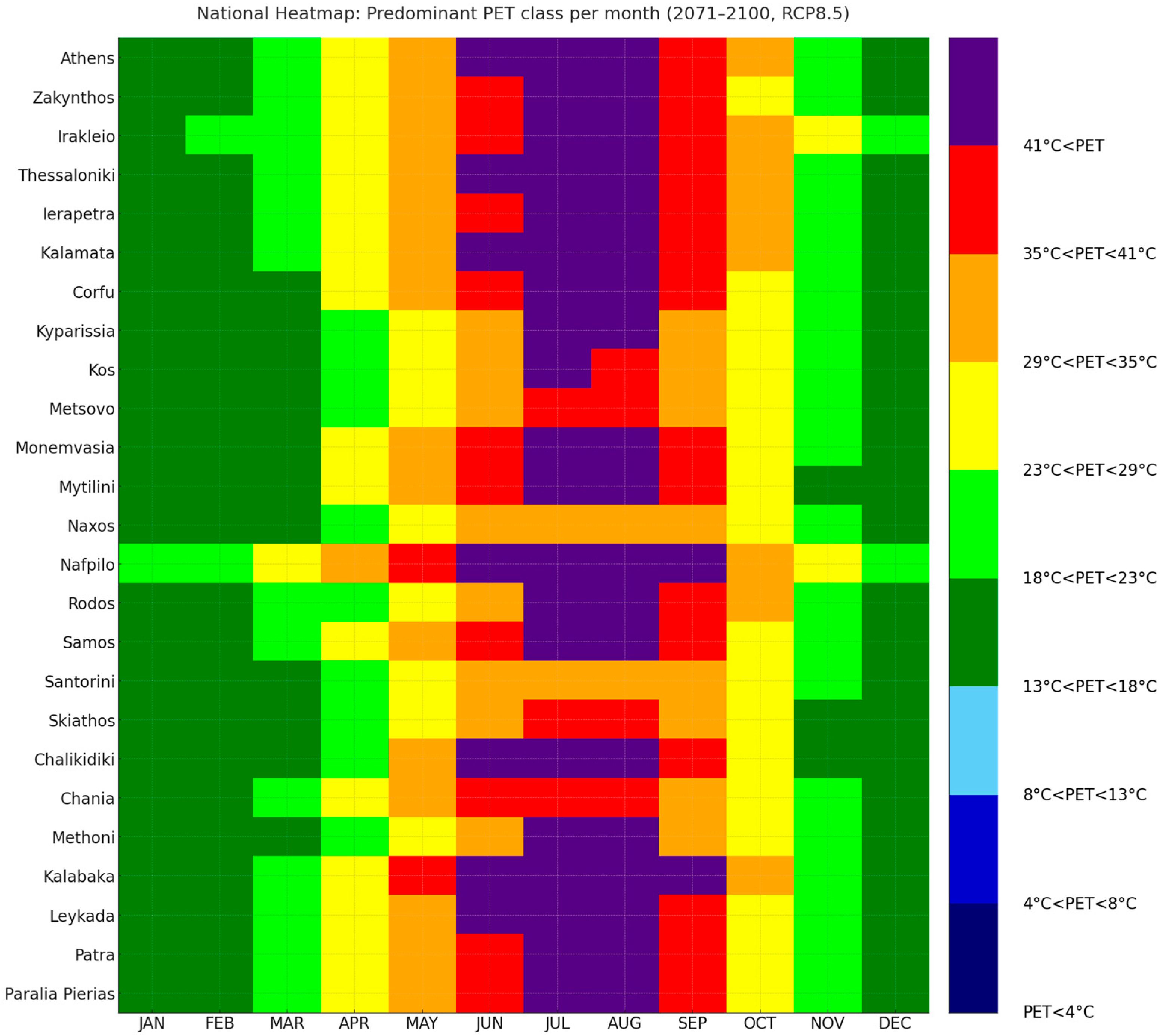Evaluating Climate Change Risks for Greek Tourism Destinations: A Bioclimatic Approach †
Abstract
1. Introduction
2. Materials and Methods
3. Results and Discussion
4. Conclusions
Author Contributions
Funding
Institutional Review Board Statement
Informed Consent Statement
Data Availability Statement
Conflicts of Interest
References
- Gössling, S.; Scott, D.; Hall, C.M. Global trends in climate change adaptation in tourism. Curr. Opin. Environ. Sustain. 2018, 31, 7–13. [Google Scholar] [CrossRef]
- IPCC. Climate Change 2022: Impacts, Adaptation, and Vulnerability. Contribution of Working Group II to the Sixth Assessment Report of the Intergovernmental Panel on Climate Change; Cambridge University Press: Cambridge, UK, 2022. [Google Scholar] [CrossRef]
- Amelung, B.; Viner, D. Mediterranean tourism: Exploring the future with the tourism climatic index. J. Sustain. Tour. 2006, 14, 349–366. [Google Scholar] [CrossRef]
- Rutty, M.; Scott, D. Will the Mediterranean become “too hot” for tourism? A reassessment. Tour. Plan. Dev. 2010, 7, 267–281. [Google Scholar] [CrossRef]
- Nastos, P.T.; Kapsomenakis, J. Regional climate model simulations of extreme air tem-perature in Greece: Abnormal or common records in the future climate? Atmos. Res. 2015, 152, 43–60. [Google Scholar] [CrossRef]
- Politi, N.; Vlachogiannis, D.; Sfetsos, A.; Nastos, P.T. High resolution projections for extreme temperatures and precipitation over Greece. Clim. Dyn. 2023, 61, 633–667. [Google Scholar] [CrossRef]
- Höppe, P. The physiological equivalent temperature—a universal index for the biometeorological assessment of the thermal environment. Int. J. Biometeorol. 1999, 43, 71–75. [Google Scholar] [CrossRef]
- Chen, Y.-C.; Chen, W.-N.; Chou, C.C.-K.; Matzarakis, A. Concepts and New Implements for Modified Physiologically Equivalent Temperature. Atmosphere 2020, 11, 694. [Google Scholar] [CrossRef]
- Jendritzky, G.; de Dear, R.; Havenith, G. UTCI—Why another thermal index? Int. J. Biometeorol. 2012, 56, 421–428. [Google Scholar] [CrossRef] [PubMed]
- Nastos, P.T.; Matzarakis, A. The effect of air temperature and human thermal indices on mortality in Athens, Greece. Theor. Appl. Climatol. 2012, 108, 591–599. [Google Scholar] [CrossRef]
- Potchter, O.; Cohen, P.; Lin, T.-L.; Matzarakis, A. Outdoor human thermal perception in various climates: A comprehensive review of approaches, methods and quantification. Sci. Total Environ. 2018, 631–632, 390–406. [Google Scholar] [CrossRef]
- Nastos, P.T.; Matzarakis, A. Present and future climate–tourism conditions in Milos Is-land, Greece. Atmosphere 2019, 10, 145. [Google Scholar] [CrossRef]
- Founda, D.; Katavoutas, G.; Pierros, F.; Mihalopoulos, N. Centennial changes in heat waves characteristics in Athens (Greece) from multiple definitions based on climatic and bioclimatic indices. Glob. Planet. Change 2022, 212, 103807. [Google Scholar] [CrossRef]
- Pantavou, K.; Kotroni, V.; Lagouvardos, K.; Kyriakou, P. Future changes of bioclimate in Greece: Variations in thermal stress according to the Universal Thermal Climate Index (UTCI). Sci. Total Environ. 2025, 980, 179514. [Google Scholar] [CrossRef]
- Matzarakis, A.; Rutz, F.; Mayer, H. Modelling radiation fluxes in simple and complex environments: Basics of the RayMan model. Int. J. Biometeorol. 2010, 54, 131–139. [Google Scholar] [CrossRef]




| Simulation | Regional Climate Model (RCM) | Εarth System Model (ESM) |
|---|---|---|
| CNRM-CERFACS-CNRM-CM5_KNMI-RACMO22E | RACMO22E | CNRM-CM5 |
| ICHEC-EC-EARTH_DMI-HIRHAM5 | HIRHAM5 | EC-Earth |
| MOHC-HadGEM2-ES_KNMI-RACMO22E | RACMO22E | HadGEM2-ES |
| MOHC-HadGEM2-ES_SMHI-RCA4 | RCA4 | HadGEM2-ES |
Disclaimer/Publisher’s Note: The statements, opinions and data contained in all publications are solely those of the individual author(s) and contributor(s) and not of MDPI and/or the editor(s). MDPI and/or the editor(s) disclaim responsibility for any injury to people or property resulting from any ideas, methods, instructions or products referred to in the content. |
© 2025 by the authors. Licensee MDPI, Basel, Switzerland. This article is an open access article distributed under the terms and conditions of the Creative Commons Attribution (CC BY) license (https://creativecommons.org/licenses/by/4.0/).
Share and Cite
Nastos, P.T.; Kapsomenakis, J.; Zerefos, C.S. Evaluating Climate Change Risks for Greek Tourism Destinations: A Bioclimatic Approach. Environ. Earth Sci. Proc. 2025, 35, 47. https://doi.org/10.3390/eesp2025035047
Nastos PT, Kapsomenakis J, Zerefos CS. Evaluating Climate Change Risks for Greek Tourism Destinations: A Bioclimatic Approach. Environmental and Earth Sciences Proceedings. 2025; 35(1):47. https://doi.org/10.3390/eesp2025035047
Chicago/Turabian StyleNastos, Panagiotis T., John Kapsomenakis, and Christos S. Zerefos. 2025. "Evaluating Climate Change Risks for Greek Tourism Destinations: A Bioclimatic Approach" Environmental and Earth Sciences Proceedings 35, no. 1: 47. https://doi.org/10.3390/eesp2025035047
APA StyleNastos, P. T., Kapsomenakis, J., & Zerefos, C. S. (2025). Evaluating Climate Change Risks for Greek Tourism Destinations: A Bioclimatic Approach. Environmental and Earth Sciences Proceedings, 35(1), 47. https://doi.org/10.3390/eesp2025035047








